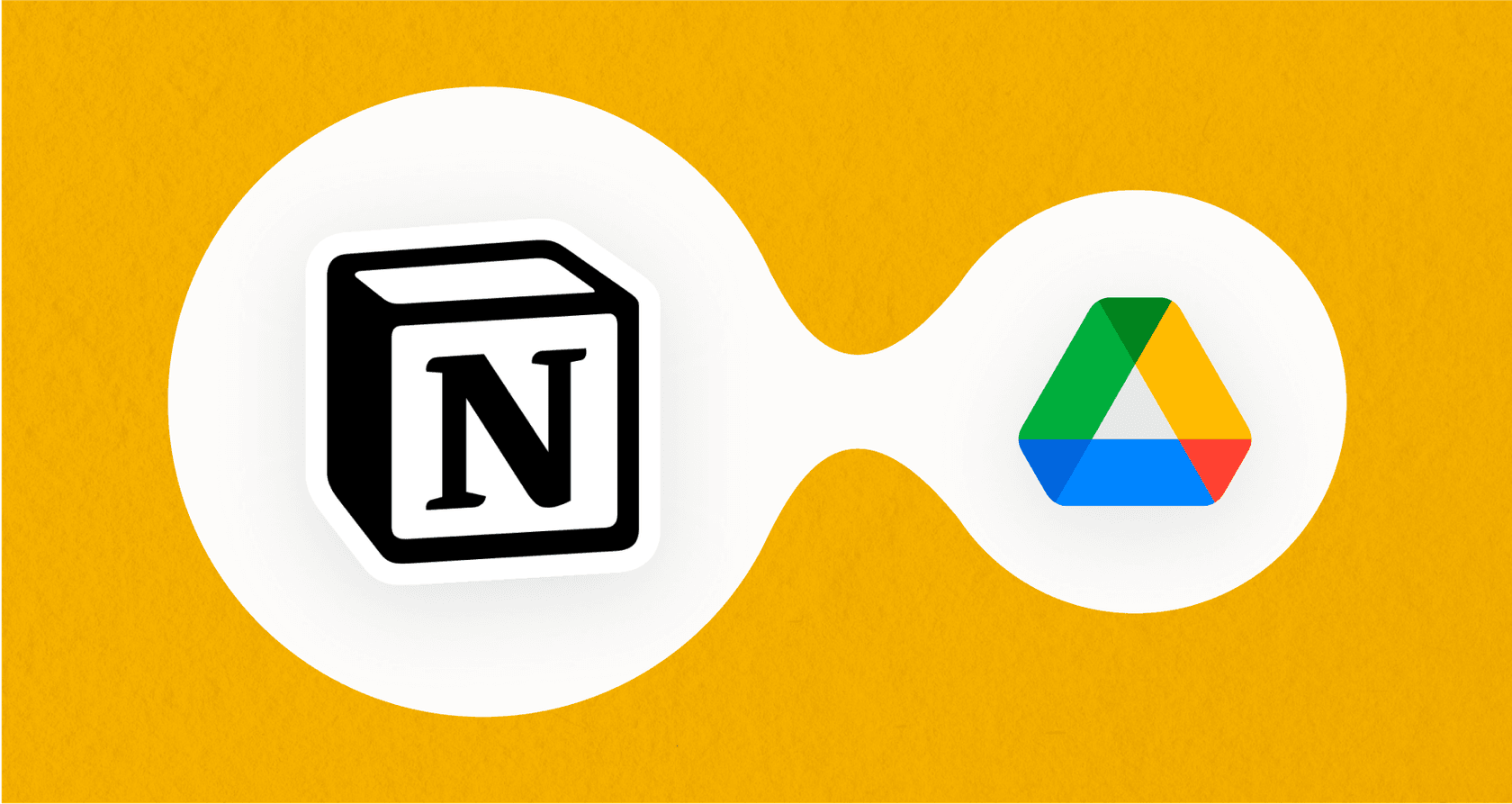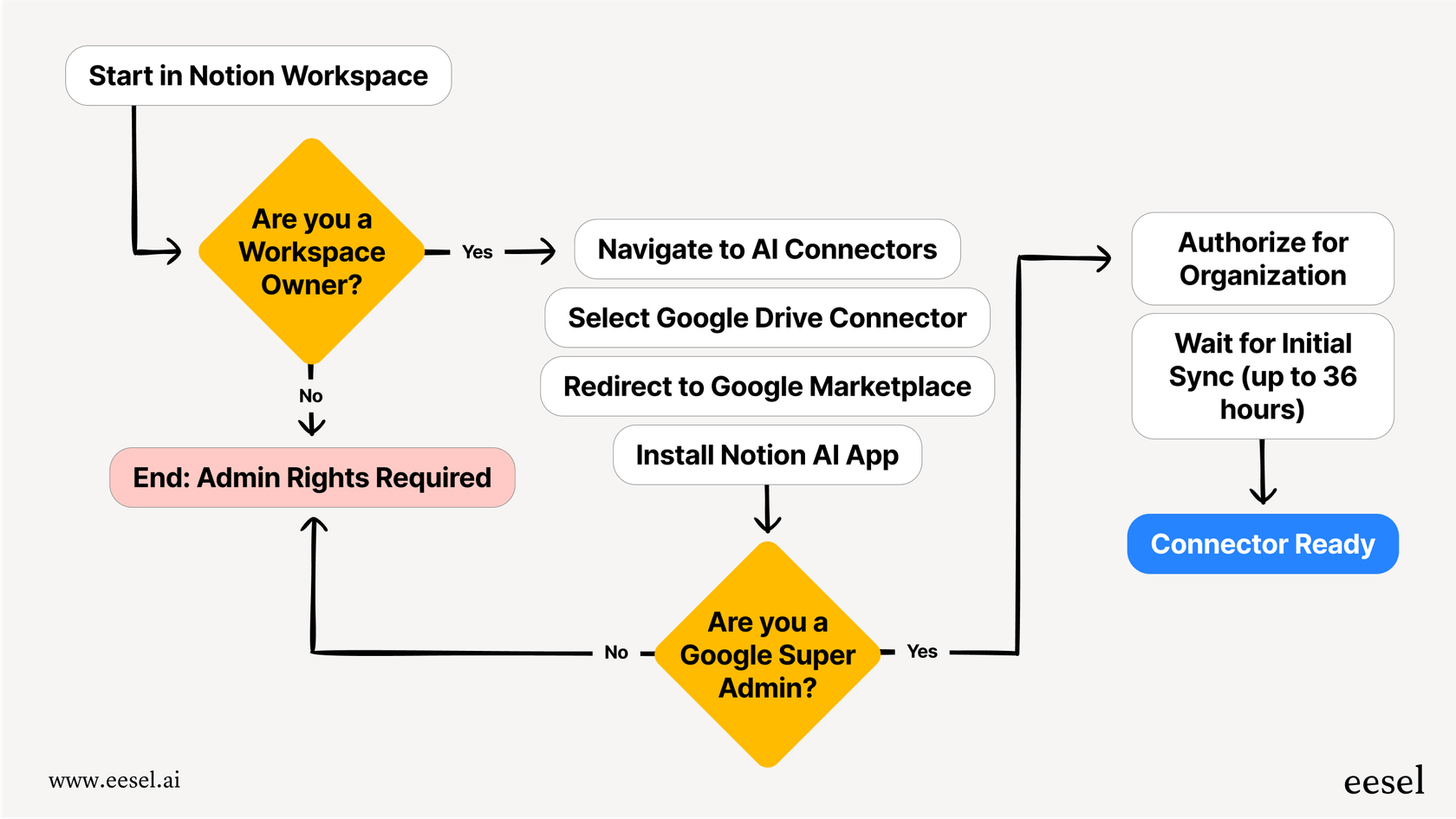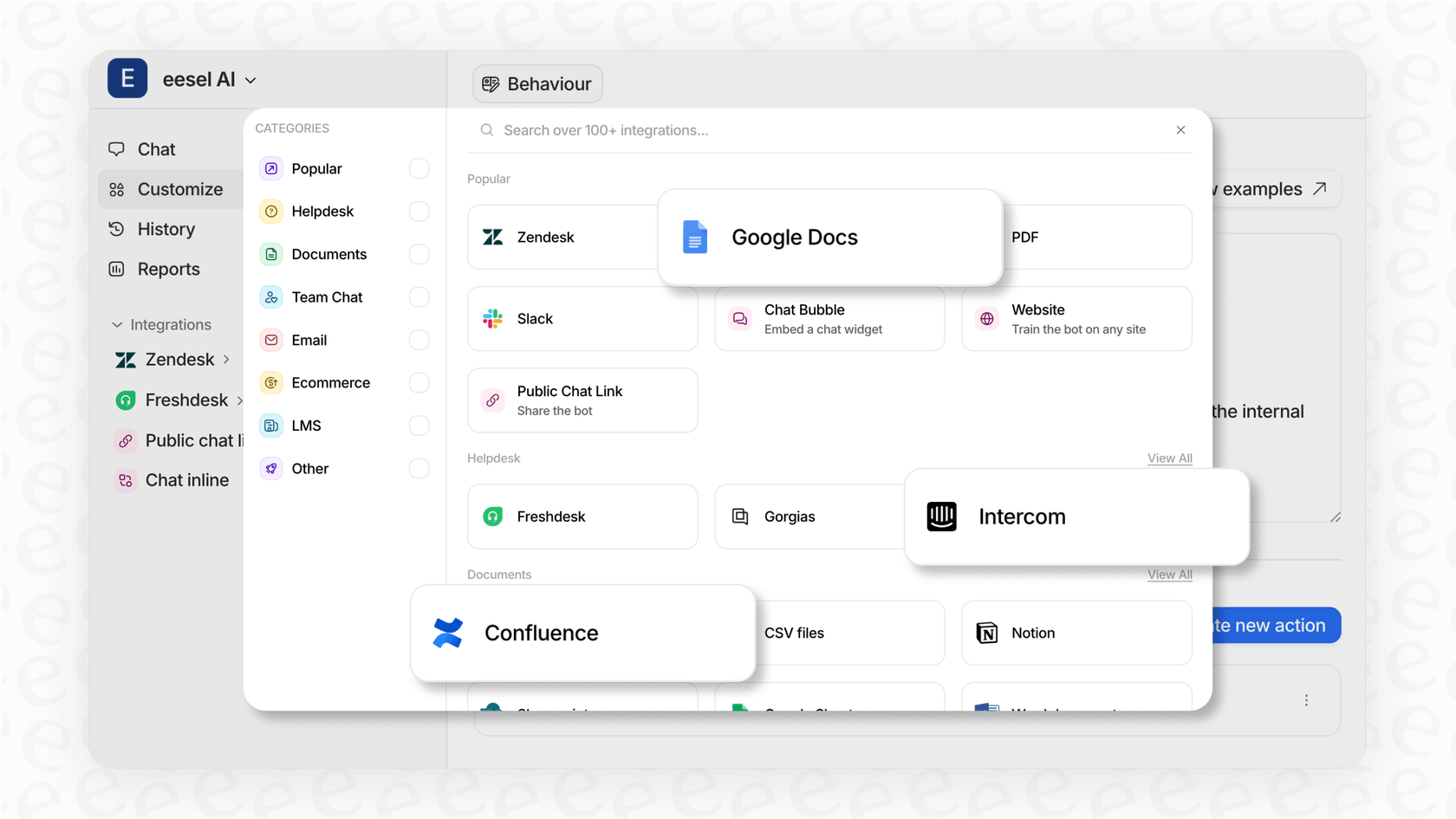A guide to the Notion AI Google Drive Connector: Features, limitations, and alternatives for 2025

Kenneth Pangan

Katelin Teen
Last edited November 9, 2025
Expert Verified

Let’s be honest, your team’s knowledge is probably all over the place. It’s a story I’ve heard a hundred times: you’ve got beautifully organized projects and wikis in Notion, but then there’s that parallel universe called Google Drive, home to every presentation, spreadsheet, and draft from the last five years. Getting these two worlds to talk to each other feels like it should be simple, but it rarely is.
Notion’s answer to this is the Notion AI Google Drive Connector. It promises to let its AI search across both platforms, pulling answers from all corners of your company's brain. It sounds great on paper, but when you look closer, things get a bit complicated. The feature is hidden behind pricey plans, strict admin requirements, and a setup process that can be a real headache for a lot of teams.
This guide will give you a straight-talking look at what the connector actually does, how to set it up, and the hidden costs that might make you reconsider. We’ll also explore a more flexible alternative for bringing all your company’s knowledge together, without the roadblocks.
What is the Notion AI Google Drive Connector?
Simply put, the Notion AI Google Drive Connector is an integration that gives Notion’s AI permission to read and understand the content of your files in Google Drive. So when you ask Notion AI a question, it doesn’t just look through your Notion pages. It also digs through your Google Docs, Sheets, Slides, and even PDFs you've uploaded.

When it finds something relevant in a Google Drive file, it’ll show you a snippet of the text and a direct link to the aoriginal document. It’s a handy way to track down the source of the information.
It’s easy to mix this up with Notion's standard Google Drive integration, but they’re very different. The standard one is basically a fancy bookmark, letting you paste a Google Drive link into a Notion page to get a nice preview. The AI Connector goes much deeper by making your Drive files truly searchable by Notion's AI. But, as we're about to see, that deeper connection comes with a lot more strings attached.
How the Notion AI Google Drive Connector works
Before you get too excited, you should know that setting up and using the connector isn't exactly a walk in the park. It feels less like a quick plug-and-play tool and more like something that needs a dedicated IT project.
The Notion AI Google Drive Connector setup and authorization process
Getting the connector up and running is where most people hit their first wall. It’s not a simple switch you can flip. Here’s what you absolutely have to have in place:
-
A Notion Business or Enterprise Plan. The connector is a no-go on the Free or Plus plans. Right off the bat, this is the biggest barrier for individuals and smaller teams who can't justify the jump in price.
-
A paid Google Workspace plan. This integration won’t work with your personal
@gmail.comaccount or a Google One plan. You need a business-level Google account for your whole team. -
Admin rights on both platforms. To install the connector from the Google Marketplace, you need to be an administrator in both your Notion workspace and your Google Workspace. This means the person setting it up needs top-level permissions, which isn't always feasible or desirable.
-
Time for the initial sync. After you’ve jumped through all those hoops and connected everything, you have to wait. Notion needs to index all of your Google Drive content, and this can take anywhere from 36 to 72 hours. You won't be getting any answers from your Drive files on day one.
As you can probably tell, this whole process is really built for larger companies with dedicated IT departments, not for agile teams or solo operators who just want their tools to work together without a fuss.
Searching across platforms with the Notion AI Google Drive Connector
Once the connector is finally live, your team can start using it. When someone asks Notion AI a question, whether it's in the chat, on the Home screen, or just in the search bar, the AI will now check both Notion and Google Drive for answers.
One thing it does really well is respect existing file permissions from Google Drive. This is a big deal for security. A user will only ever see search results from files they already have permission to access. So you don’t have to worry about confidential HR documents or sensitive financial spreadsheets popping up for the wrong person. It's secure, which is great, but that doesn't change the fact that the setup friction and high cost are pretty significant drawbacks.

The hidden costs: Pricing and limitations of the Notion AI Google Drive Connector
The real problems with the Notion AI Google Drive Connector aren't about what it does, but who can actually use it. The feature is locked away behind pricing and administrative gates that make it impractical for a huge chunk of Notion's user base.
Strict plan and user requirements
Let's just be blunt: this connector is an expensive feature. It's only available on Notion’s top-tier plans, which means a pretty big price jump for anyone on a personal or small team plan.
| Plan | Monthly Cost (per user/month) | Key Limitation for Connector Access |
|---|---|---|
| Free / Plus | $0 / $8 | Not available |
| Business | $15 | Minimum required plan for connectors |
| Enterprise | Custom Pricing | Includes advanced security & support |
A quick look at Notion’s official pricing tells the story. You have to commit to at least the Business plan at $15 per user per month (and that's if you pay annually) just to get in the door. When you add the required cost of a paid Google Workspace account, the total investment puts the feature out of reach for freelancers, startups, and even a lot of mid-sized businesses. The feedback from the community is pretty clear on this, it often feels less like a useful feature and more like an upsell tactic.
The Notion AI Google Drive Connector's siloed approach to knowledge
Even if the price and admin hurdles aren't an issue for you, the Notion AI Google Drive Connector still promotes a limited view of your company’s knowledge. It’s a point-to-point solution that connects just two applications. But think about it, is that really where all of your team's important information lives?
What about all those critical decisions and project updates happening in your Slack channels every day? What about the detailed technical documentation your engineering team keeps in Confluence? Or the years of customer feedback and troubleshooting knowledge buried in your Zendesk tickets?
A truly smart knowledge system needs to learn from all of these places, not just one or two. This is where the single-connector model really starts to show its weaknesses. Instead of trying to pull all your data into one tool, a much more effective approach is to create a flexible AI layer that learns from all your sources at the same time. For example, a platform like eesel AI is built from the ground up to connect with Google Drive, Confluence, your help desk, and more, all at once, creating a single, unified brain for your entire business.
A better way than the Notion AI Google Drive Connector: Unifying knowledge vs. connecting apps
Instead of forcing your data into one app's ecosystem, a better strategy is to build a central AI that learns from everywhere your team is already working. This approach gets around the limitations of single-purpose connectors and ultimately delivers a lot more value.
The power of a centralized AI brain
When your AI can pull insights from all your company's knowledge sources, you unlock a whole new level of productivity. You start getting more accurate, context-rich answers because the AI can see the full picture, not just a small piece of it.
This naturally breaks down the information silos that form between departments. Your support team can suddenly get answers from engineering docs in Confluence, and your product team can spot trends from customer conversations in your help desk. The best part? You can deploy this single, consistent AI assistant wherever your teams already are, whether that means answering questions in Slack or helping agents right inside their support tool.

How eesel AI offers a more flexible solution
This is exactly the problem we built eesel AI to solve. It’s designed to be that intelligent, flexible layer that unifies your knowledge without locking you into a rigid and expensive ecosystem.
-
Get started in minutes, not days. Forget about begging for admin rights and waiting up to 72 hours for a data sync. eesel AI is built for you to use yourself. You can connect your knowledge sources with one-click integrations and have a working AI assistant in just a few minutes.
-
Connect all your tools. eesel AI doesn't stop at Google Docs and Notion. It seamlessly integrates with help desks like Zendesk and Freshdesk, wikis like Confluence, and chat tools like Slack and Microsoft Teams. It builds one source of truth from all the places your team already works.
-
Works where you work. Instead of making everyone log into Notion to ask a question, eesel AI meets your team where they are. You can use it as an internal Q&A bot in Slack or as a copilot for agents in your help desk. It adapts to your workflow, not the other way around.

Is the Notion AI Google Drive Connector right for you?
At the end of the day, the Notion AI Google Drive Connector is a powerful feature with a very, very narrow audience. If you're a large company that's already paying for Notion's Enterprise plan and is fully committed to the Google Workspace ecosystem, and you have the IT resources and budget to manage it, then it might be a solid choice.
For just about everyone else, freelancers, small teams, startups, and any business looking for a solution that is both flexible and affordable, the connector is probably not the right fit. The high cost, strict admin requirements, and limited scope are pretty big deal-breakers.
The future of workplace AI isn't about building slightly better-connected silos. It's about creating a single, unified intelligence that understands all of your company's scattered knowledge and works with the tools you and your team already use and love.
If that sounds like a better way to work, you can set up a free AI agent with eesel AI in a couple of minutes and see what a difference it makes.
Frequently asked questions
It's an integration that allows Notion's AI to search and understand content within your Google Drive files, including Docs, Sheets, Slides, and PDFs. This means Notion AI can pull answers from both your Notion pages and Google Drive documents.
To set it up, you need a Notion Business or Enterprise plan, a paid Google Workspace account, and administrator rights in both Notion and your Google Workspace. It is not available for Notion's Free or Plus plans or personal Google accounts.
After the connection is made, Notion requires time to index all your Google Drive content. This initial synchronization process can take anywhere from 36 to 72 hours before you can begin retrieving answers from your Drive files.
Yes, it prioritizes security by respecting your Google Drive's file permissions. Users will only see search results from files they already have explicit access to, ensuring confidential information remains protected.
It's considered siloed because it only connects two applications, Notion and Google Drive, leaving out other crucial knowledge sources like Slack, Confluence, or Zendesk. This limits the AI's ability to provide a truly comprehensive understanding of your company's information.
Yes, platforms like eesel AI offer a more unified approach by connecting with a wider range of tools, including Notion, Google Drive, Confluence, and Slack. This creates a central AI that learns from all your sources simultaneously, fostering a single source of truth.
It is primarily suited for large organizations that are already on Notion's Enterprise plan, fully committed to Google Workspace, and possess the necessary IT resources and budget. For most other teams, its high cost, strict admin requirements, and limited scope are significant drawbacks.
Share this post

Article by
Kenneth Pangan
Writer and marketer for over ten years, Kenneth Pangan splits his time between history, politics, and art with plenty of interruptions from his dogs demanding attention.





